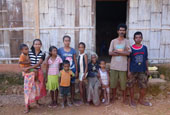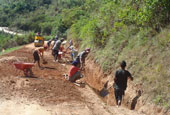Rural development
Timor-Leste: When a short road makes a huge difference
In a country where 75 per cent of the population live in rural areas and 40 per cent are below the poverty line, improving a short stretch of road can mean more jobs and a better quality of life for rural workers and their families.
 |
They are getting by as subsistence farmers and their little income comes from selling agricultural products such as corn and sweet potatoes. Coffee-growing activities bring them an additional US$ 400 per season. But the journey to the market is long and difficult and the money they make is not enough to pay for school items or medicine.
 |
This is a short-term job but it brings precious extra cash for the family, and the construction of the new road has been a win-win situation for them.
"Before, we had no job opportunities. Then the road project came and we were really happy to get involved. The work can be hard at times, but we are happy to have it. An improved road makes transport easier and now we feel that we can better support ourselves,” said Trindade.
According to Graciano Soares, chief of Hatugau Village, an improved road means more business and a better quality of life.
 |
The road project and Trindade's hiring was made possible thanks to the "Enhancing Rural Access Project (ERA)", funded by the European Union, and the "Roads for Development Programme (R4D)" project, funded by the Australian Government.
The aim of these two large scale projects – implemented by the ILO together with the Government of Timor-Leste – is to improve the country’s rural infrastructure by training and engaging local companies in labour-based rural road construction and maintenance. The companies then hire members of the community to work on the road upgrading programme.
Creating jobs through the private sector
Both projects are helping to generate much-needed employment opportunities for people living in rural areas of Timor-Leste. At least 30 per cent of jobs created go to women.
The ILO has been working with the State Secretary for the Support and Promotion of the Private Sector (SEAPRI) through the ERA project to train Timorese contractors in rural road construction and contracts management.
"SEAPRI is a new government institution that is responsible for assisting and developing the private sector of Timor-Leste and we are pleased to work with the ILO to empower national entrepreneurs and to assist them to achieve their goals," said Veneranda Lemos, the State Secretary for SEAPRI.
Eugenia Monteiro Turquel is the head of Proniamor, a local start-up company that has been tasked with rehabilitating two kilometres of the 10.5 km Letefoho Vila-Leimea Sorinbalu road.
| Thanks to the improved roads, local communities have access to a significantly improved public transport system and increased economic activity." |
Her company was trained in labour-based techniques, including how to maximize the use of local resources and the equipment needed to meet technical and engineering standards, and how to organize and manage a large workforce while ensuring cost effective operations and good quality work.
Vann Samsan, an ILO Labour-Based Field Engineer, has been supervising the work done by the companies.
"We support the contractors with technical and management advice. We check the quality of work and make sure that companies are on schedule. Most of them had some prior experience in civil works, usually road works, but even so, they often lacked technical knowledge and needed to upgrade their contracts management skills,” he explained.
More than 100 local companies have so far been trained in the same way through the ERA and R4D programmes and are now working their way through the country's rural road network.
“In communities where cash earnings are usually very low, the programme contributes to generate additional income for rural families. Also, thanks to the improved roads, local communities have access to a significantly improved public transport system and increased economic activity," concluded Roberto Pes, ILO Head of Mission in Timor-Leste.